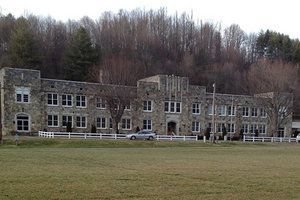One of the longest nerves in the body is known as the vagus nerve (VN). The VN is the 10th pair of cranial nerves that originates at the brain stem in the medulla oblongata. This nerve is part of the parasympathetic nervous system, which is a part of the ANS. Research suggests ear acupuncture can activate the VN.
Roots in the Community, Branches Far Beyond
The Jung Tao School of Classical Chinese Medicine (JTS) was founded in 1998 by Sean Christian Marshall in Sugar Grove, North Carolina, a small community near Boone in the state's westernmost mountains. Early in its life, JTS aligned with Cove Creek Preservation and Development (CCP&D), a community based non-profit, toward the goal of preserving the historic Cove Creek High School, a beautiful WPA building completed in 1941 that has been a community center for generations. CCP&D and community leaders decided to support job creation in its available space in order to produce rental income that would make community projects possible. JTS moved its school and administrative operations to the second floor of the building in 2003, and its intern clinic currently occupies a large section of the first floor.
Marshall and several members of the CCP&D envisioned a clinic that housed both Eastern and Western medicine and could serve the members of the small community. In 2015, that vision began to come to fruition when JTS was approached by the Community Care Clinic (CCC), a non-profit with the goal of providing integrated healthcare to low-income persons in our community. Located in Boone, the CCC realized that a large percentage of un-insured individuals were located in the Sugar Grove area. The fit of JTS with CCC was apparent in the first meeting, and after months of discussion and paperwork, JTS offered to share their space with CCC rent-free in order to provide local residents with the best of both worlds. In December 2015, the Community Care Clinic began seeing patients in the JTS intern clinic on the few days a week that the intern clinic is closed.

Jung Tao's intern clinic operates on a sliding scale, and the vast majority of patients never pay the full price for a treatment. Most come from the surrounding community; many do not have a primary care physician and only drive into Boone to see a doctor in an emergency. Aligning with CCC has allowed patients with suspected chronic illnesses such as diabetes or high blood pressure to receive medical care in the same clinic where they receive acupuncture, which aids continuity of care. The Community Care Clinic supports integrated healthcare and refers their clients to the JTS Intern Clinic for treatments, knowing they will only be charged what they can afford.
Research Impact

In 2015, Nicole Rodney, PhD, MPH, an upcoming student-intern at JTS and a medical anthropologist, was awarded a grant to study the effects of acupuncture on aging. Rodney and collaborators at the University of California-San Diego (UCSD) partnered with JTS and the Pacific College of Oriental Medicine (PCOM) to conduct this study, funded by the Healthy Aging Institute of UCSD. The study tests the hypothesis that intensive acupuncture treatments (3 times a week for 8 weeks) will increase the activity of the enzyme telomerase, which contributes to telomere length, a marker of aging. Telomeres are tails of DNA on the ends of chromosomes that shorten as our cells replicate, and this shortening is correlated with overall aging. This is the first study on humans to test whether or not acupuncture treatments have an impact on cellular aging. Each individual participating in the study will have 24 treatments over the course of 8 weeks and will submit to several blood tests. The hope is that the positive results of this pilot study will lead to a larger study substantiating the effects of acupuncture on the aging process.
This pilot study involves the recruitment of 30 people over the age of 50 to have treatments at JTS and 30 to have treatments at PCOM. Recruitment for participants at JTS was easily accomplished; 30 willing participants were easily identified, along with a log of potential back-up participants. Offering free treatments brought in individuals with limited or no experience with acupuncture, and many have already begun to see the benefits the treatments they are receiving. The treatments are not prescribed, so patients are treated for whatever ailment or imbalance they show up with (though everyone in the study self-identified as suffering from depression and/or anxiety, and every treatment touches on this complaint in some way). In addition to helping the study, the patients are receiving care for ailments, and JTS interns are seeing and learning from a wider range of patients.
One woman was particularly skeptical about acupuncture, but very interested in getting personalized data on her telomeres, so she signed up. She is diagnosed with anxiety and gets a migraine every week. She has been coming in for two weeks and hasn't had a migraine since before the study began. She's now a believer!
Another participant has been dealing with severe depression since having a stroke several years ago. She also has a variety of aches and pains, including plantar fasciitis and heel spurs. Both physical ailments were resolved with one treatment and she believes her depression is decreasing, as she always reports feeling peaceful after treatments.
JTS has also agreed to participate in a nationwide study being performed by Tyler Phan, a medical anthropologist from University College London (UCL). Along with his academic experience, Phan is a Vietnamese lineage acupuncturist, studying traditional medicine in Vietnam since he was 15-years-old. He is also a licensed acupuncturist in Pennsylvania where he had a community acupuncture clinic in Pittsburgh for four years.
Phan is conducting a cross-country ethnography of what he styles "American Chinese Medicine." His research investigates the relationship between regulatory bodies, schools, and practitioners, as well as the history and possible futures of the profession.
When Phan comes to JTS, he is returning to the school where he learned acupuncture in the United States - but this time as a researcher to explore the dynamics between a non-TCM school and the regulatory bodies that shape most of the institutions and practices in the United States. He is visiting many different acupuncture schools across the country and interviewing faculty, administrators and students to create a landscape of the current state of the profession's educational system and the challenges it faces. JTS is the 11th Chinese medicine institution in his cross-country ethnography.
Sugar Grove, North Carolina may appear isolated; for many years, the region was referred to as "the Lost Province" because of its inaccessibility, and residents joked that "the best way to get here is to be born here." But times have changed and JTS is optimistic that the healing efficacy of AOM will continue to draw an increasing number of patients from this local area for treatment at the school's intern clinic.



